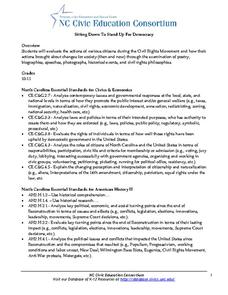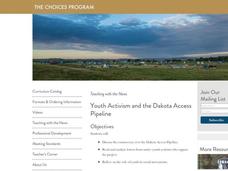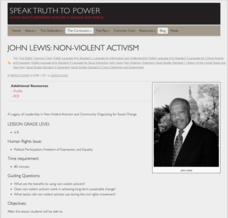National Endowment for the Humanities
Revolution '67, Lesson 1: Protest: Why and How
To some people, protesting is as American as apple pie, but the factors that lead to protests can be as confusing to veteran activists as to today's youth. Revolution '67 explores the riots in Newark, New Jersey as a case study. Using...
University of North Carolina
Sitting Down To Stand Up For Democracy
Boycotts and bus rides, sit-ins and speeches. The focus of this amazing resource is on those people who were willing to put themselves at risk to take a stand for their belief in equal rights for all. A must-have for your curriculum...
Brown University
Youth Activism and the Dakota Access Pipeline
Do young people have a role in social movements? Should they? The involvement of young people in the Dakota Access Pipeline is the focus of a resource that asks class members to examine letters written by native youths who oppose the...
National Woman's History Museum
Introduction to Activism
Activist, feminist, and labor organizer Dolores Huerta are perhaps best known for her work with Cesar Chavez to create the United Farm Workers. Class members explore primary source documents to learn more about this Medal of Freedom winner.
Stanford University
Lesson Plan: The Children's Crusade and the Role of Youth in the African American Freedom Struggle
Young people played significant roles in the Civil Rights movement. Class members examine the contributions of Barbara Johns, Claudette Colvin, Mary Louise Smith, and the children of Birmingham,...
Center for Civic Education
Martin Luther King Jr. and the Power of Words
It is easy to forget the power that written or spoken word can have in effecting change. Using quotations from such inspirational leaders as Maya Angelou, Mahatma Gandhi, and Martin Luther King Jr., encourage your class members to...
Curated OER
The Movement Before the Movement: Civil Rights Activism in the 1940s
Many educators focus on the civil rights movement as it occurred after Rosa Parks incited the bus boycott. Extend the understanding of the fight for civil rights in the United States with this post-WWII lesson. Learners examine and...
Speak Truth to Power
John Lewis: Non-Violent Activism
After comparing and contrasting non-violent and violent social movements, your young historians will take a closer look at the work and influence of John Lewis on the civil rights movement. They will then choose a current social justice...
iCivics
The Road to Civil Rights
Here is a fantastic resource on the civil rights movement! It includes reading materials and worksheets, and particularly highlights major legislation and the role of the judicial branch in the federal government in addressing the...










